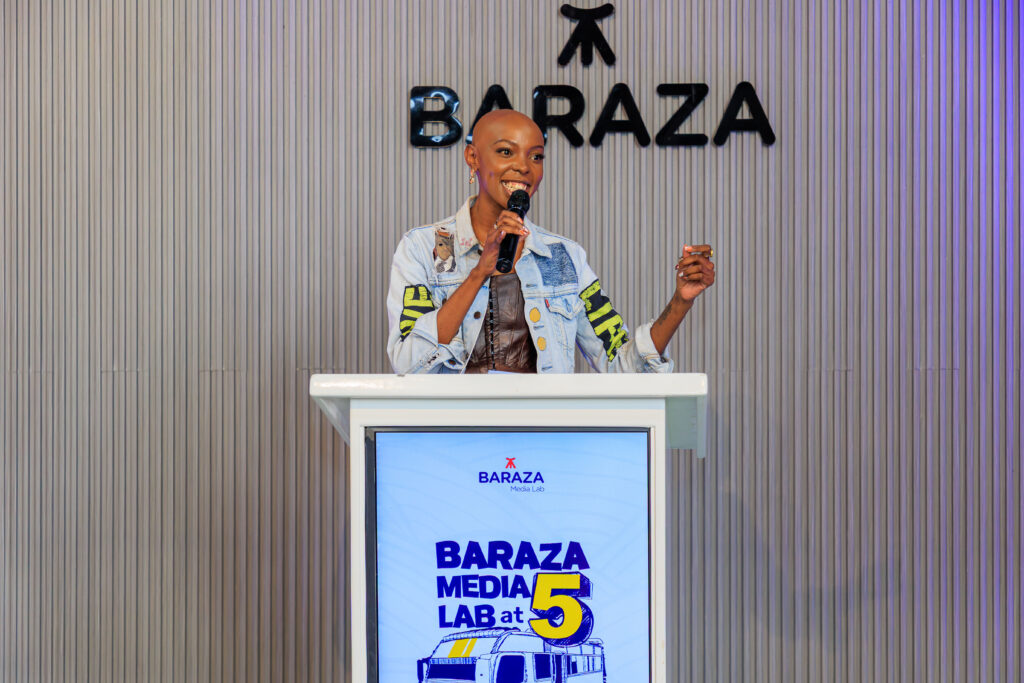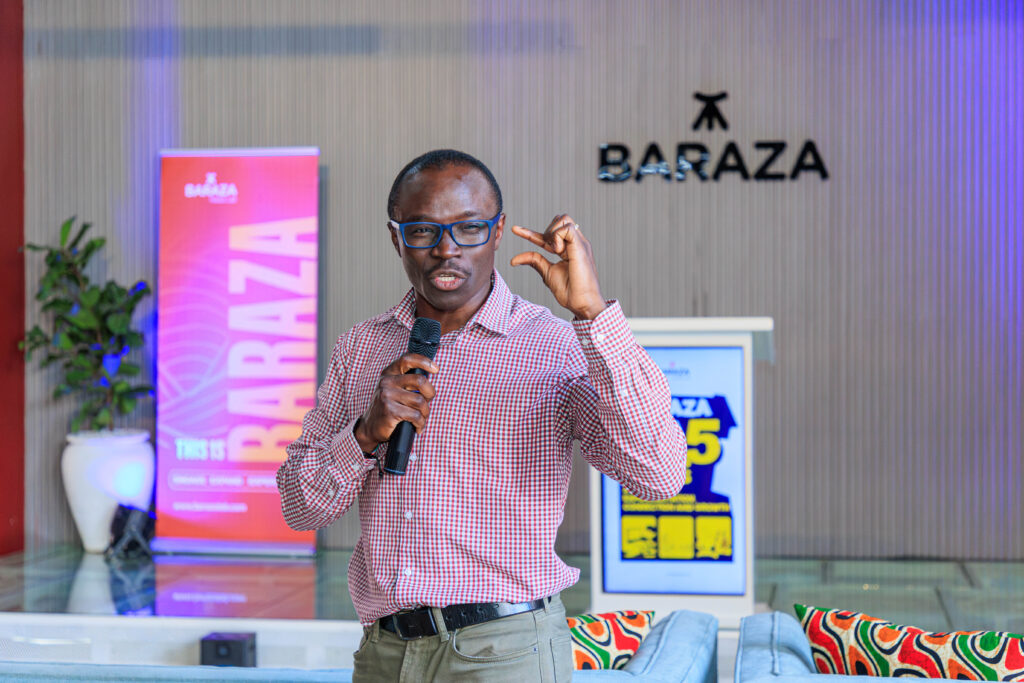Baraza Media Lab on Friday commemorated its fifth anniversary with a bold reflection on its journey and a renewed commitment to shaping the future of Kenyan media. The Baraza@5 commemoration comes at a pivotal moment as the local media sector much like the rest of the globe, is threatened by numerous sustainability and growth challenges.
According to the 2025 Assessment of Media Environment report by the Media Council of Kenya, Kenya’s media workforce is increasingly freelance and youthful with 65% of journalists under the age of 35, yet most lack formal contracts or benefits. Similarly, 62% of journalists cited financial pressure as a barrier to ethical reporting.

Adelle Onyango, Vice-Chair of the Baraza Media Lab Board of Directors and Kenyan media personality, speaks to attendees at the Baraza@5 commemoration held at the Industrial Area Hub in Nairobi.
The report also notes that misinformation and disinformation remain a growing threat to the development of media in Kenya with underutilization of AI and other technology tools due to underinvestment and skills gaps. Additionally, the 2025 Reuters Digital News Report reveals a surge in news avoidance with 50% of audiences in Kenya compared to 40% globally now sometimes avoiding news, and which is the media industry’s mainstay.
“At Baraza we have turned this urgency into action with the sole aim of empowering our independent creators through learning, un-learning and re-learning the transitions in technology, content types and audience preferences as well as the shift from the precarious Advertising revenue models to new creator or audience-led approaches”, said Maurice Otieno, Executive Director, Baraza Media Lab.

Maurice Otieno, Executive Director of Baraza Media Lab, welcomes guests to the ‘Baraza@5’ commemoration, which also marked the launch of the Industrial Area Hub in Nairobi.
Speaking at the newest Baraza Media Lab hub located on Enterprise Road in Nairobi’s Industrial Area, Otieno announced the creation of three other hubs, one each in Mombasa, Kisumu, and Nakuru Counties, adding that the hubs with just under 5 months of operations were already reaching over 5, 000 young people with mentorship, training, and opportunities.
The Industrial Area hub, located in the middle of a community that reflects Kenya’s productive energy, media savvy and ambition, is an affirmation that each journalistic and creative voice deserves the support and attention that a platform like Baraza can provide.
“These hubs give form to our vision of a country where public interest media and creative practice are supported not only in Nairobi but across diverse regions. Indeed, the next ground-breaking journalist, podcaster, or civic innovator could emerge from any region, not just Nairobi”, added Otieno.
Founded in 2019, Baraza has become a cornerstone of innovation, collaboration, and resilience in Africa’s rapidly evolving media ecosystem, driven by a dynamic portfolio of programs that among others address four critical themes of Innovation in Monetization, Media Literacy Vs Misinformation, Demand for Data-Driven Journalism, and Cross-Sector Collaboration.
Baraza’s flagship programs including Data Storytelling Fellowship and the African Media Festival, have helped media practitioners navigate precarity, embrace ethical tech, and build sustainable business models over the last 5 years. Others include She Leads Media, Baraza Sessions, and Creative Clinics which have enabled media practitioners and creatives to experiment with form and content.
Baraza’s Fumbua initiative, a response to rising digital threats, continues to deliver tools like editorial guidelines and media literacy toolkits, across media houses, civil society, and technology experts. SemaBOX, Kenya’s first and Africa’s largest podcast incubator also continues to inspire a generation of audio storytellers.
“By nurturing a generation of storytellers who use data, ethics, and innovation to shape public discourse, we’re not just telling stories, but changing the story of the media itself. Baraza is a blueprint for what African media can be, collaborative, creator-led, and community-rooted,” added Adelle Onyango, Vice Chair of Baraza Media Lab’s Board.

Viivi Nousiainen, Coordinator at the Embassy of Finland in Nairobi, enjoys a ride in a Kenyan Public Service Vehicle, popularly known as ‘Nganya,’ as part of the curated Baraza@5 commemoration experience, enroute to the new Baraza Media Lab’s Industrial Area Hub.
Looking ahead, Baraza will focus on strengthening the new community-centred hubs to stay connected and respond to local needs, allowing media practitioners and partners to actively contribute to the direction of Baraza’s work while also helping design Baraza’s future.
These will also include continued grant work, convenings, training, and partnerships geared towards building viable revenue models for creators and newsrooms, strengthening media literacy and verification, accelerating data journalism capacity, and knitting multi-stakeholder collaborations into a coherent support system for Kenyan media.